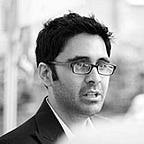The Way of the Warrior
What the End of America Means for the Future
When the history of this era is written, I think it will say something like: “America was a strange little tribe of warriors, that flourished for an instant and then, just as suddenly, fell.” A warrior tribe. When you think of America that way, everything so perverse, so maddening about it begins to make a little more sense. Life as a constant series of tests, of emotional combat. No leisure time, screaming faces on every kind of media, an inability to feel empathy. The spoils of an entire society to the most predatory. Things like a “Salvation Army” —even virtue itself can only be seen through the eyes of war when a society is a warrior tribe.
But this isn’t an essay about American collapse. It’s about the world, the future, and what we hope to make of it. America is finished, but it’s downfall tells us something urgent, vital, true.
There are many ways to live, organize, dream, endure, grow. I’ll contrast just two here. The way of the warrior, and the way of the shepherd. Which should we — the world beyond America, the little warrior tribe that fought itself to death — choose? How are we to address the great global challenges of climate change, mass extinction, economic stagnation, and rising extremism?
Now the limitations of the way of the warrior are clearly revealed in the story of American collapse. War causes a deficit of love, peace, truth in the human heart, which always then thirsts for more of what doesn’t really satisfy it — more honor, more blood, more treasure. And so as much and as swiftly as a nation conquers, the price is always the same: none of those conquests seem to add up to genuine prosperity for people. Why not? Because the way of the warrior says that exploitation — both inside and outside — is just, virtuous, necessary. So soon enough society itself becomes the battleground. Like America today, people end up broken, cities ruined, lives shortened — war outside is always, too, war inside. The idea of a public good cannot coexist with the way of the warrior. So the way of the warror can’t solve today’s great global problems — in many ways, it itself has created them. It is imbalanced against nature, human, social, and animal — only humans choose to make war, and thus war itself is a choice to be against nature.
Then there is the way of the shepherd. The shepherd’s way is very different. The shepherd isn’t setting his sheep against the next flock. Nor is he trying to exploit his sheep to the last penny — for soon there would be no flock. He is simply coexisting with his sheep, in a mutuality. He guides them, but doesn’t control them. They are both intertwined in an intricate dance of interdependence, each providing different “resources” — the shepherd leads the way to the grass, and the sheep provide sustenance, too, for the shepherd.
Now, the shepherd’s way leads to very different outcomes than the warrior’s way. The flock endures. The grass grows. The sheep die, it’s true, but they live not just in peace — they realize the potential of sheep, creating milk and wool and so on. So for all the sun shines from the heart. The children can come and play in the very same field. There is a natural order and harmony and grace in the shepherd’s way.
What do I mean by “the Shepherd’s Way” when it comes to global political economy? It should be clear, if it’s not already. I mean that cooperation must precede conflict, that peace must precede war, that prosperity must precede conquest, that interdependence must precede independence, that natural limits must dictate possibility. We already see hints of the Shepherd’s way emerging, don’t we? The EU is built on a kind of Shepherd’s way. The idea itself has resonance in Scandinavian notions of equality and mutuality.
But it is just an idea, an ideal type. And yet the stakes for the future couldn’t be clearer. We cannot model a future on America. America itself is the failure of the past. The American Way — which was never really peace, justice, and apple pie, but conflict and violence as the one true solution to every problem — cannot solve today’s great problems.
And maybe there is a deeper lesson there. Whatever problems that we solve with violence, conquest, conflict only yield newer, worse ones. Don’t they? We conquer a land, and soon enough there is an ISIS. We make “war” on “drugs” and soon enough there is an opioid epidemic. The little warrior tribe: it never quite understood that war is not a answer to what the human heart genuinely hungers for, love, grace, truth, peace — and so conflict yields only more conflict.
But precisely the reverse is true for the shepherd’s way. When we solve the problem of leading the flock to pasture, of shearing the wool and nurturing the child, of living in harmony and grace with the grass and wind and rain, there are no more problems created. When we solve problems without conflict, adversity, conquest, then they don’t create more, worse, problems. Once in a while, there is the storm. But the sun still shines.
Umair
August 2017
